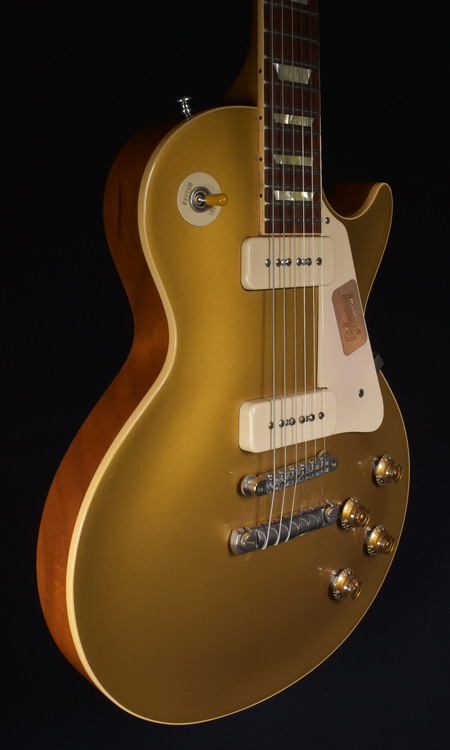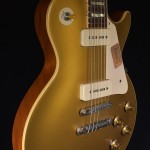The Gibson Les Paul Model as it stood in 1956 is a pure rock’n’roll legend, represented in greater detail than ever before in the 1956 Les Paul Goldtop Reissue. This was not quite where the Les Paul had begun, and not quite where it was going, but a powerful stop along that road that carried plenty of important features that have made this mid-’50s marvel a beloved tone machine to this very day. The guitar still retained its fat, snarling P-90 pickups and a rounded ’50s neck profile that not only feels superb in the hand, but also transmits added string vibration from neck to body to enhance resonance. One of the most significant changes to the Les Paul Model of 1956, though, was the addition of the new Tune-o-matic bridge and stopbar tailpiece—which debuted on the Les Paul Custom two years before—replacing the trapeze and wraparound tailpieces that had adorned earlier versions. The innovative Tune-o-matic—also known as the ABR-1—was the brainchild of celebrated Gibson president Ted McCarty, and set the standard for simplicity and functionality in electric guitar bridge design.
In addition to its foundation of a solid, lightweight mahogany body with carved maple top and a glued-in, quarter-sawn mahogany neck with long-tenon neck joint, the 1956 Les Paul Goldtop Reissue benefits from Gibson Custom’s 20th Anniversary Specifications, newly adopted for 2013. These include a one-piece rosewood fingerboard, Kluson™ Deluxe machine heads, hot-hide neck glue, a Historic Truss Rod assembly with no tubing, accurate body and fingerboard binding color, and period-correct Goldtop and back/neck finish colors, the latter treated to Gibson Custom’s proprietary VOS process for a gently worn look and feel. Put it all together, and the 1956 Les Paul Goldtop Reissue is the quickest route to the look, feel, and tone of a great vintage Goldtop made nearly six decades ago.
The sonic powerhouse of the 1956 Les Paul Goldtop Reissue remains its two fat single-coil P-90 pickups, beloved since the 1940s for their aggressive midrange, solid low end, and sparkling, silky highs—with that ever so slightly gritty edge for added cutting power. Gibson makes its P-90s today just like it did a full 60 years ago, with two Alnico V bar magnets in each pickup and coils wound with approximately 10,000 turns of 42 AWG wire, for plenty of beef when you hit ’em hard, but crystalline clean tones when you back off the guitar’s volume controls. Bumble Bee tone caps assist in that warm, singing “woman tone” when you roll back the tone controls, too. To top it all off, the 1956 Les Paul Goldtop Reissue plays superbly right out of its Custom Shop hardshell case thanks to a trip through one of Gibson’s state-of-the-art Plek machines before it leaves the Custom Shop floor.



